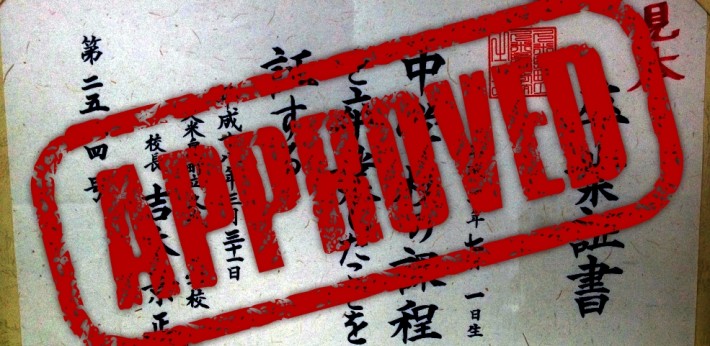I hate to be the one to break it to you, but majoring in Japanese might just be the worst thing you can do for your career. Sure you love Japanese and majoring in the language seems like the perfect way to spend your years in college, but is it really worth it? Do you know what you're getting yourself into? Maybe it could work for you, but it's certainly not going to work for everyone.
1. You Might be Better Off Studying on Your Own

I think many would assume that if you major in a language, you'll be pretty awesome at that language after four years of study. This is completely false. I had four years of Japanese language study at college, and even spent 10 weeks abroad studying in Kobe, Japan. However, by the time I graduated, my Japanese skill was about that of a preschooler, maybe worse.
This is not due to poor study habits or anything like that. I was a pretty good student, and I actually enjoyed my Japanese classes so I really tried hard and also tried to make the most out of them. But the thing is, most classroom Japanese just goes too slow and you really don't learn all that much considering how long you study it. Of course this depends on the school and the curriculum, but I feel this to be true on the whole. I think I learned the most when I was actually in Japan just talking to people – not in the classroom doing lessons.

Therefore, as far as learning Japanese goes, you might just be better off studying on your own, going at your own pace, and learning Japanese the way you want to, learning the Japanese that is helpful, interesting, and useful to you. At the very least, you should be supplementing your classroom Japanese with your own self-study. Use WaniKani, or TextFugu, or Anki, or just anything that works for you. You need to supplement. Do not expect to become fluent in Japanese just because you major in it.
Some people need the Japanese classes just to have that motivation and a definitive schedule for learning, and I can understand that. But if you're really going to learn the language and have it be beneficial and worth it, you're going to need to put in plenty of study time on your own, outside of the classroom.
To be honest, you really don't need the classes at all and could be spending that class time learning something more valuable instead. But if you do find yourself in a Japanese classroom, make sure you make the most of it. Remember, your Japanese fluency is up to you and you alone.
2. Other Languages are More Useful, for Business Anyway

In the 1980s and 1990s, learning Japanese was a great thing to do for business. Japan was starting its worldwide takeover, and knowing Japanese made you super-duper employable for the business. These days French, Chinese, Spanish, Arabic, and even Russian and Portuguese are all languages that rank higher than Japanese as far as being useful in the business world. Japanese just isn't as valuable as it used to be.
Japanese is still very popular though, because, well, Japan is awesome. Some people want to learn Japanese because of all the cool anime, manga, and video games that come out of Japan. Other people just love the language and the culture and some even want to live there. I don't blame them. But if you want to learn a language to be successful in the business world, you can certainly do better than Japanese.

Now, I'm not trying to say that Japanese is worthless for finding a business job – not at all. There are plenty of jobs to be found at Japanese companies such as Honda and the like, I'm just saying that you might have better success with one of the other languages given the competitive job market these days. Plus languages like French and Spanish are easier to learn than Japanese, but more on that later.
3. Limited or No Jobs

Speaking of finding jobs, the job market really sucks for Japanese majors these days. Sure you can teach English in Japan (which is BS, btw) through a program like JET or something, but where are the advancement opportunities there? Plus, you don't even need to know Japanese for most of those teaching programs!
You could also teach Japanese, but you're not going to be able to teach past your skill level, and as we covered in #1, the skill level of the average Japanese graduate probably isn't that high. And since it's not that high, you're not going to be able to get jobs like being an interpreter, translator, or anything cool like that. Also, there really aren't too many job opportunities for you if your Japanese is your only marketable skill, but again, more on that later.
4. Debt

Student debt is a huge, rotten issue. Depending on your parents, your school, and if you have any scholarships or work during undergrad, you can graduate with no debt, or a lot of debt. If you graduate with a lot of debt, you'd be best off landing a job that will pay you a lot of money. Most likely, whatever job you get with your sub-par Japanese (as per #1) isn't going to be all that great or pay that well.

Being in debt sucks. Life and everything in general is just so much more stress-free and easy when you don't have to worry about debt. I don't know about you, but if I was in debt, I'd want to get out of it as soon as possible. Now, I'm not saying that you should do something you hate but pays well just to get out of debt – it's just something to think about. Think of your future and plan accordingly.
5. It's Hard

I'm sure you've heard it before and I'm sure you'll hear it again. Despite what some may say, Japanese is still pretty hard comparatively. I've studied both French and Spanish before, and let me tell you – it's so much easier to get the hang of than Japanese, especially for a native English speaker. The biggest part for me is just the writing system. If it was just the speaking part, I don't think it would be that bad. It's the written Japanese that's the killer.
Learning Japanese isn't for everyone. If you're going to try and conquer the problem mentioned in #1, you're going to have to tough out how hard Japanese is to master and work hard on your own to become fluent. If you want a job, and a job that pays well, expect to work really hard at mastering Japanese. Unless you're a language savant, it's going to be a rough journey.
Times When Majoring in Japanese Would be Okay

In my opinion, there are at least two cases when majoring in Japanese would make sense and be okay for someone to do. Those two things are: you're really good at it, or you major in something else too. First, let's explore why being really good at Japanese would make majoring in it acceptable.
1. You're Like, Super Good at It

If you're really good at Japanese and you love it so much that you study your brains out on your own time and really devote yourself to the language, there's a good chance you'll be super good at it by the time you graduate. Maybe you'll even be so good you won't have to deal with the intermediate plateau. Maybe you won't even have to do anything. Good job.
Since you're fluent, or near fluent in the language now, you're much more employable. You can teach at a higher level, get jobs in the government, be a translator, an interpreter, or anything else of the sort.
Since most people aren't at this level when they graduate, you'll be head and shoulders above the rest, and that's great. The only problem is – you don't know if you're going to be good at Japanese or have what it takes to really study your brains out for those four years before you actually start doing it. So like I said before, if you're planning on going this route and you want to succeed and make money, be prepared to stick it out and really dedicate yourself to the language.
2. You Have Other Useful Skills

The other reason why you might consider majoring in Japanese is if you already have another marketable skill, or if you're majoring in something else (that's useful) as well. This way, even if your Japanese isn't that great when you graduate (like mine) you'll still be able to find a job and get dat money, son.
My undergraduate journey was kind of a wild one (six years long with many major and minor changes), but by the end of it, I graduated with a double major in Japanese and Economics with a minor in Engineering. If I had just majored in Japanese, I would probably have a terrible job right now, but I don't. I get to help out with all this Tofugu stuff, and for my day job I work as a Chemical Information Specialist. It's pretty great.

Majoring in economics gave me tons of writing practice, and I'm sure all that practice helped me land this position with Tofugu. Plus, I worked IT for three years in undergrad and I love computers, so it was really easy for me to get the hang of WordPress and all the other tech stuff going on behind the scenes here on Tofugu/TextFugu/WaniKani. If Japanese was all I was really good with, I probably wouldn't be here.
Same goes for my other job. My computer skills and engineering mindset helped me land this position, and I don't even use any Japanese at all. If all I knew was Japanese, I would most definitely not be where I am today. Plus, for most jobs I interviewed for after I graduated that had a Japanese requirement, my Japanese wasn't good enough. Take Honda for example.

After I graduated, I applied for a position with Honda at a large research and development facility. The position was an IT position, but this was no problem since I had three years of IT experience under my belt from working at my university. However, they also needed someone who could help troubleshoot the machines of the Japanese employees who would be more comfortable talking things out in their native tongue.
Everything went great until the Japanese part. It was actually really embarrassing. While I never really felt super confident in my Japanese ability, this really made it crystal clear that my Japanese just wasn't up to snuff and that my college courses really didn't prepare me for landing a job where Japanese competency was needed. Needless to say, I didn't get the job. They even cited my lack of Japanese competency as the reason why.
Be Prepared

So the bottom line is: be prepared. If you're not really, really good at Japanese and you don't have any other useful skills, life after graduation might just be abysmal for you. So don't put all your eggs into the Japanese basket unless you're confident that you're going to be the most bestest Japanese speaker that there ever was.
If you know you're not going to be that awesome at Japanese by the time you graduate, do yourself a favor and develop some other employable skills as well, or double major, or at least make Japanese a minor and choose a more lucrative major. But that's just my two cents. Everyone is different and opportunities and lucky breaks are bound to happen, so things might work out for you even if you don't agree with how I feel. You never know!

And just to be sure, I am in no way trying to put anyone down or make anyone feel bad and I'm certainly not trying to tell people to not follow their dreams. I'm just trying to get you to think about the best way to achieve them. I have some friends who really regret majoring in Japanese, so I'm just trying to get you thinking about things so the same thing doesn't happen to you if you're considering it. I want you all to succeed and be happy!
